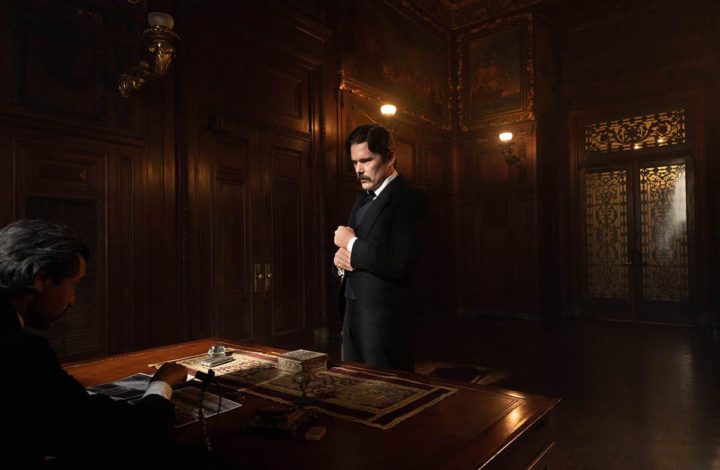
MPAA Rating: PG-13 | Rating: ★★
Release year: 2020
Genre: Biography, Drama Director: Michael Almereyda
Tesla is a contemporary quasi-postmodern biopic which, like its eponymous subject, is an ambitious and lofty noble failure. It embraces its artifice through a smarmy, self-satisfied style which is decidedly undeserved—Tesla is a bit peculiar, but it isn’t brazen or bizarre. Where I found filmmaker Michael Almereyda’s earlier similarly-styled biopic, Experimenter, to be a wonderfully wacky cinematic experiment, Tesla feels comparatively inert. For all its electrifying potential, I found little to keep my attention, less still to ponder afterwards in terms of What It All Means.
Tesla stars one of my favorite actors, Ethan Hawke, in the titular role of the enigmatic scientist/inventor. Hawke plays Tesla as a near-mute brooding man who seems constantly lost inside his head. While the film covers many of the main events throughout Tesla’s life, it primarily structures what little narrative there is around two conflicts: a rivalry with Thomas Edison (Kyle MacLachlan, in a scenery-chewing role) and a potential romance with Anne Morgan (Eve Hewson) the daughter of the very wealthy J.P. Morgan (Donnie Keshawarz). Each of these actors gives interesting performances, but the script and direction often limit them to talking abstractly in darkened rooms or staring at one another.
What makes Tesla distinctive is how it employs Anne as the fourth-wall-breaking narrator informing us about Tesla’s life. Hewson’s is really the stand-out performance, imbuing Anne with a somber brashness through her voiceover narration; there’s a dryly gothic quality to her. She invites us to do Google searches on various characters, and explains the deception of fantasy scenes afterwards, such as a fictionalized ice cream cone fight between Edison and Tesla. I recognize that biopics often fall into rigid Oscar-bait conventions. But sometimes there’s a reason why the formula works; sometimes being “unconventional” is simply being obstinately aloof, didactic, or just plain weird for the sake of weirdness. For instance, instead of using real-life locations or even CGI backdrops, we see actors situated in front of plainly painted backdrops which call attention to their phoniness. But this artificial aspect isn’t utilized in a way to call our attention to some discernible grand idea; it just feels like cheap sets. We are never unaware that this is Ethan Hawke and Kyle MacLachlan playing parts in a low-budget production stage; the film’s explicitly faux mise-en-scene disallows us from suspending disbelief, and the lack of rhythm in the narrative flow and editing makes it difficult to get to any emotional or ideational grip within the uneven current.
This self-reflexive formalist approach sometimes leads to playful moments, such as a scene with MacLachlan eagerly sitting down at a cafe table to eat a slice of pie (an overt Twin Peaks nod). But the humor elicits more smirks than outright laughs, and the film has a cerebral ethos (not unlike Hawke’s Tesla) which makes laughter somehow feel intrusive or inappropriate. Other supporting performances from a mustachioed Jim Gaffigan as inventor/investor George Westinghouse and an elegant Rebecca Dayan as actress Sarah Bernhardt are laudable, as is a delightful-but-brief cameo from Lois Smith. Yet for all its formal experiments, Tesla still seems strangely subdued; had it turned the “wacky” dial up to 11, I probably would have been thrilled. Despite its cat metaphors and roller-skating and anachronistic karaoke scenes, Tesla just isn’t absurd enough. For a film about a man brimming over with bold novel ideas, Tesla doesn’t appear to have many (or any) of its own.
IMDB Listing: https://www.imdb.com/title/tt5259822/
Leave a Reply